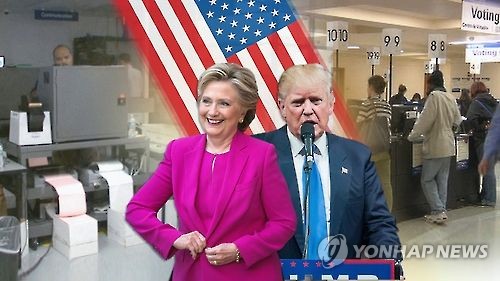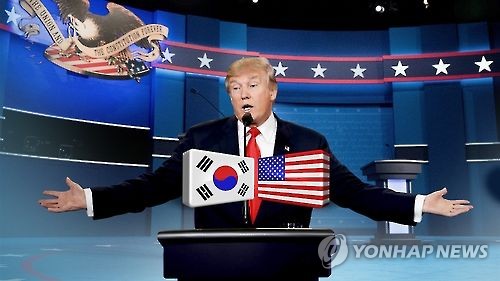- California Assembly OKs highest minimum wage in nation
- S. Korea unveils first graphic cigarette warnings
- US joins with South Korea, Japan in bid to deter North Korea
- LPGA golfer Chun In-gee finally back in action
- S. Korea won’t be top seed in final World Cup qualification round
- US men’s soccer misses 2nd straight Olympics
- US back on track in qualifying with 4-0 win over Guatemala
- High-intensity workout injuries spawn cottage industry
- CDC expands range of Zika mosquitoes into parts of Northeast
- Who knew? ‘The Walking Dead’ is helping families connect
Trump’s victory heightens policy uncertainty for S. Korea: experts
SEOUL, Nov. 9 (Yonhap) — The unexpected win of the U.S. presidential election by Republican candidate Donald Trump will likely increase policy uncertainty for South Korea which needs a strong alliance with Washington more than ever in the face of growing threats from North Korea, experts here said Wednesday.
Earlier, U.S. voters chose Trump as their next president over his Democratic rival Hillary Clinton giving him more than half of the 538 electoral college votes. The result came against many previous polls that predicted Clinton ahead in the race.
Policymakers and experts here have been concerned about controversial remarks that Trump has made on the campaign trail regarding his policy toward the North, trade with its allies and many other issues.
Among other things, Trump has demanded fair burden-sharing for the U.S. troop presence in South Korea, while arguing that a free trade deal with Seoul is hurting his country and there could be renegotiations with the agreement reached years ago.
He even went as far as to support South Korea and Japan arming themselves with their own nuclear weapons in case U.S. withdraws its troops there, a stance that is out of line with other mainstream politicians in Washington.
With a real estate mogul that has no policymaking background at the helm and few communication channels that could give a glimpse into his thoughts, it would be inevitable for South Korea to face mounting uncertainty in many areas including how to deal with North Korea’s nuclear ambitions, experts said.
“It will become difficult to predict policy direction,” said Woo Jung-yeop, a researcher at the Asan Institute for Policy Studies, a private think tank. “At a time when it’s hard to say who will comprise the new cabinet and there are few contact points inside for us, it will be hard to figure things out.”
“I do not think that there will be an extreme change in everything, but one thing that is sure is that unpredictability has increased compared to if Hillary Clinton won the White House,” he added.
Citing his lack of experience in foreign affairs and international relations along with his straightforward way of speaking, he even worried that Trump could cause diplomatic problems on many fronts, though he will likely learn from mistakes as his presidency goes on.
Kim Heung-kyu, a political science professor at Ajou University, echoed the concerns over increasing uncertainty and unpredictability.
He, however, said that one thing clear about the president-elect, which is that he cares a great deal about the national interest and economy and places more emphasis on profits over alliances with other global partners.
“Trump seems to believe that what is most important is having power and power comes mostly from national capability. He also appears to think economic power is the key element that comprises national capability,” he said.
“Having said that, Trump is likely to seek his external policy focusing on economic profits… This means his external policy aims mostly to maximize profits while cutting down on unnecessary costs.”
“It will become difficult to predict policy direction,” said Woo Jung-yeop, a researcher at the Asan Institute for Policy Studies, a private think tank. “At a time when it’s hard to say who will comprise the new cabinet and there are few contact points inside for us, it will be hard to figure things out.”
“I do not think that there will be an extreme change in everything, but one thing that is sure is that unpredictability has increased compared to if Hillary Clinton won the White House,” he added.
Citing his lack of experience in foreign affairs and international relations along with his straightforward way of speaking, he even worried that Trump could cause diplomatic problems on many fronts, though he will likely learn from mistakes as his presidency goes on.
Kim Heung-kyu, a political science professor at Ajou University, echoed the concerns over increasing uncertainty and unpredictability.
He, however, said that one thing clear about the president-elect, which is that he cares a great deal about the national interest and economy and places more emphasis on profits over alliances with other global partners.
“Trump seems to believe that what is most important is having power and power comes mostly from national capability. He also appears to think economic power is the key element that comprises national capability,” he said.
“Having said that, Trump is likely to seek his external policy focusing on economic profits… This means his external policy aims mostly to maximize profits while cutting down on unnecessary costs.”
Some experts said that his economy-driven diplomacy could weaken the U.S. involvement in international affairs especially in Asia, which could heighten security concerns among its allies faced with a belligerent North.
“Given that Trump tends to see alliances from an economic perspective, he will likely make allies take on more burdens. In the end, the U.S. involvement in the Asian region could weaken with less security support for them. It could eventually cause such countries as South Korea and Japan to feel more concerned about their security,” said Kim Hyun-wook, a professor at the Korea National Diplomatic Academy.
Another possible serious issue is the burden-sharing of stationing U.S. troops in South Korea as Trump has repeatedly brought it up during his presidential campaign.
He has said that South Korea has not paid its fair share of the burden in keeping nearly 30,000 U.S. troops deployed here to counter the threat from the North. Seoul currently pays roughly half the costs estimated at about US$900 million a year.
“(It) could have a negative impact on South Korea-U.S. alliance down the road,” Park Won-gon, professor at Handong Global University. “What is worrisome is that the burden-sharing issue can turn into a political one. In that case, it is feared to shake the alliance from its foundation.”
Some, however, cautiously expect that the Trump-led administration could seek conversation over continued confrontation with the North, saying there could be a breakthrough. For the possibility, they called on South Korea to better prepare for a sudden change in the diplomatic landscape.
South Korea has been adamant of having no talks with the North unless it shows “meaningful” steps toward denuclearization, a stance in line with the Obama administration.
“The Trump government will likely maintain the current stance of putting pressure on the North for the time being. But he seems to prefer negotiations to confrontations with the North (given his business background),” said Kim Heung-kyu, political science professor at Ajou University. “Quite a dramatic development including attempts to have negotiations with the North can come without South Korea’s involvement.”
“The way Trump thinks seems to be different than the way other ordinary political leaders think. Risks and opportunities are right there. I believe we could ironically capitalize on the opportunities for positive changes in our ties with the U.S. and China,” he said. The scholar said it is necessary for the country to be prepared to reduce the risks and increase the benefits from any opportunities that may arise.















k
November 10, 2016 at 11:22 PM
Case Studies in Environmental Medicine – Environmental …